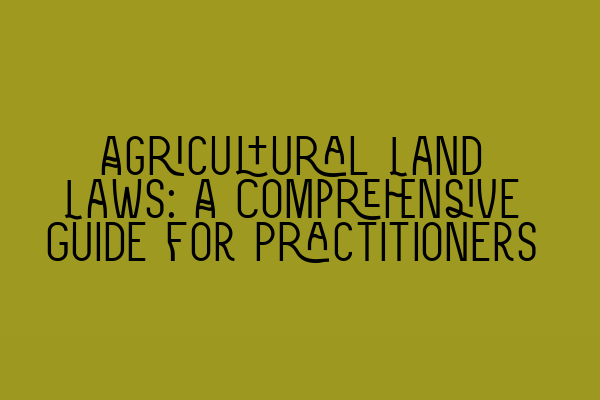Agricultural Land Laws: A Comprehensive Guide for Practitioners
Welcome to SQE Property Law & Land Law, your trusted resource for all your property law needs. In this in-depth guide, we will explore the intricate world of agricultural land laws. As a solicitor specializing in property law, it is essential to have a comprehensive understanding of the laws and regulations governing agricultural land. This guide will equip you with the knowledge and insights needed to navigate the complexities of agricultural land transactions and disputes.
1. Understanding Agricultural Land Laws
Agricultural land laws encompass a wide range of legal principles and regulations relating to the ownership, use, and management of land used for agricultural purposes. These laws are designed to protect the interests of farmers, landowners, and the general public while ensuring sustainable agricultural practices.
To start, it’s important to familiarize yourself with the key statutes and regulations related to agricultural land. The Agriculture Act 2020, for example, introduced significant changes to agricultural policy, including the phasing out of the Basic Payment Scheme and the introduction of the Environmental Land Management Scheme.
Furthermore, understanding the EU Common Agricultural Policy and its impact on agricultural subsidies and regulations is crucial. Although the UK has left the EU, many of the regulations and frameworks established under the Common Agricultural Policy still apply.
2. Key Considerations in Agricultural Land Transactions
When advising clients on agricultural land transactions, there are several key considerations to keep in mind. These include:
a. Tenancy Agreements: Agricultural tenancies can be governed by different regimes, including the Agricultural Holdings Act 1986 and the Agricultural Tenancies Act 1995. Understanding the nuances of these regimes is essential when negotiating and drafting tenancy agreements.
b. Planning Permissions: Agricultural land transactions may involve planning permissions for various purposes, such as building farm structures or diversifying land use. It is essential to have an understanding of the planning process and the relevant policies and regulations.
c. Farm Business Tenancies: Familiarize yourself with the legal framework governing farm business tenancies, including the Agricultural Tenancies Act 1995. Knowing the rights and obligations of landlords and tenants under these tenancies is crucial when advising clients.
d. Environmental Considerations: Agriculture plays a vital role in environmental stewardship. Understanding the environmental regulations, such as those outlined in the Environmental Protection Act 1990 and the Water Resources Act 1991, is crucial to ensuring compliance and sustainable land management.
3. Resolving Agricultural Land Disputes
Disputes related to agricultural land can arise for various reasons, ranging from boundary disagreements to disagreements over tenancy arrangements. As a practitioner, it is essential to understand the dispute resolution mechanisms available and be proficient in alternative dispute resolution processes such as mediation and arbitration.
In some cases, litigation may be necessary to resolve agricultural land disputes. Familiarize yourself with relevant case law and precedents, including landmark cases such as Ashburn Anstalt v Arnold, which dealt with agricultural tenancy disputes.
4. Staying Up-to-Date with Agricultural Land Laws
The field of agricultural land laws is constantly evolving, with new legislation and case law shaping the legal landscape. As a practitioner, it is vital to stay up-to-date with these developments to provide the best possible advice and representation to your clients.
SQE Property Law & Land Law offers a range of resources and courses to help you stay informed and enhance your expertise. Check out our SQE 1 Practice Exam Questions and SQE 1 Practice Mocks FLK1 FLK2 articles to test your knowledge and prepare for the SQE exams. Additionally, our SQE 2 Preparation Courses and SQE 1 Preparation Courses will help you develop the necessary skills to succeed in your legal career.
Keep an eye on the SRA SQE Exam Dates article to stay informed about upcoming examination dates and ensure you stay on track with your professional development.
Conclusion
Agricultural land laws play a vital role in regulating the ownership, use, and management of agricultural land. As a practitioner specializing in property law, having a comprehensive understanding of these laws is essential. By familiarizing yourself with the key statutes and regulations, staying up-to-date with developments, and honing your legal skills, you will be well-equipped to navigate the complexities of agricultural land transactions and disputes.
Remember, SQE Property Law & Land Law is here to support you every step of the way. Explore our range of resources and courses to enhance your knowledge and stay ahead in this dynamic field of law.
